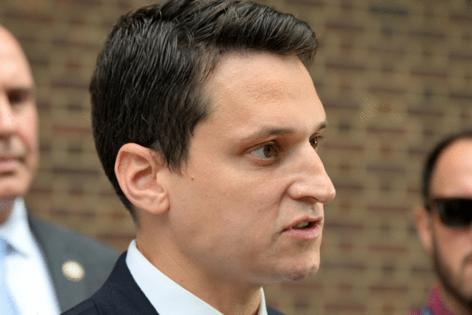Why did a Senate committee vote on Trump's nominee for Philly's top federal prosecutor a second time?
Published in News & Features
For a second time, the Senate Judiciary Committee voted Thursday to send the nomination of interim U.S. Attorney David Metcalf to the full chamber — a move that Republicans hope will make it easier to confirm him to the post.
Metcalf is currently serving as the top federal prosecutor in the Philadelphia region, but he needs confirmation to make that role permanent.
His appointment — along with those of several other of President Donald Trump's U.S. attorney nominees — has not received a Senate vote as Democrats in the chamber have sought to oppose many Trump administration nominees. The committee first approved Metcalf's nomination in June with a voice vote by a majority of members.
On Thursday, Judiciary Chairman Chuck Grassley (R., Iowa) asked senators on the committee to vote again, this time by roll call, which passed 16-6.
That distinction in voting will make it easier for Metcalf to secure the full Senate's approval by insulating him from floor challenges, according to a spokesperson in Grassley's office.
A full Senate vote is not expected before next week.
Unlike a voice vote, a committee roll call vote is a formal record maintained by the Library of Congress. Once established, the record makes it more difficult to challenge the nominee on the Senate floor.
The roll call vote will "ensure ... [the nominees'] eligibility," the spokesperson said.
Metcalf was part of a group with nine other U.S. attorney nominees who were previously reported out of the committee via voice vote. Thursday's roll call vote was done "en banc," meaning that the group was nominated in a single vote.
All the Republicans on the committee voted to support Metcalf, while several Democrats did not. Republicans control the committee as the majority party in the Senate.
Metcalf was nominated by Trump earlier this year. As U.S. attorney, he would oversee about 140 lawyers responsible for prosecuting a variety of federal cases across a nine-county region from Philadelphia to Allentown and west past Reading.
Prosecutors in the U.S. Attorney's Office are responsible for cases involving violent crime, drug trafficking, political corruption, cybercrime, tax fraud, and terrorism, as well as civil cases involving allegations of fraud, discrimination, and civil rights violations.
Metcalf has retained a decidedly low profile since taking office in March. He did not make his first public appearance until several months after assuming the job, and he has avoided taking controversial positions or using the type of blustery rhetoric that some other Trump-nominated federal prosecutors have embraced during their first year in office.
Several nearby offices have also been thrust into turmoil due to disarray over who should lead the office. The situation is particularly chaotic in New Jersey, where the state's federal judges declined to extend the tenure of Trump's nominee, Alina Habba, and chose a different prosecutor to replace her — only for Attorney General Pam Bondi to promptly fire that replacement.
The question of who will take over in New Jersey remains unresolved. The judges' choice, Desiree Leigh Grace, vowed to do so even after Bondi ordered her termination. Trump, meanwhile, has continued to back Habba, his former personal attorney and longtime political ally.
©2025 The Philadelphia Inquirer, LLC. Visit at inquirer.com. Distributed by Tribune Content Agency, LLC.







Comments